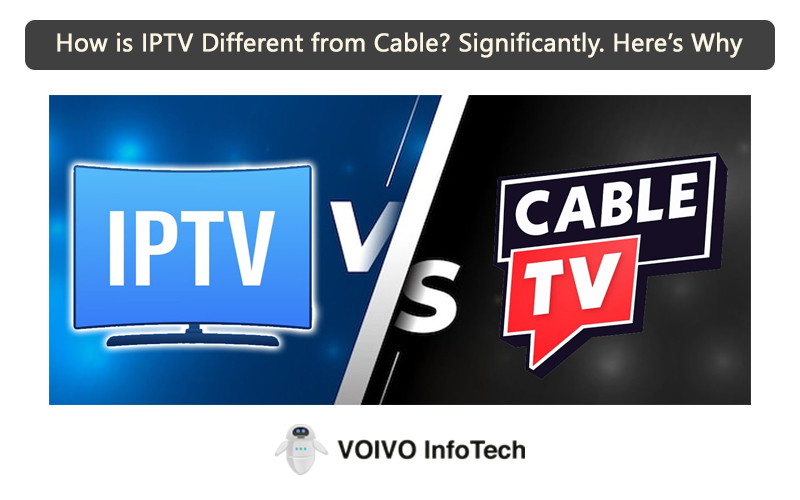The IPTV/OTT technology changed the media industry completely. People are switching from cable and satellite to streaming media via the Internet. They do this for the sake of convenience and flexibility that online consumption brings.
In other words, online video streaming services are gaining viewers while traditional television is losing them, especially young audiences who prefer watching videos through the Internet.
Cable and satellite television differ significantly from IPTV systems. And these differences attract more and more viewers worldwide. Let’s explore them.
IPTV vs. Cable: What is the Difference?
Cable TV
To picture what cable TV is, recall those days when we waited for a favorite show to air at a fixed time and weekday. Some can remember family fights over a remote control and arguments about whose turn it is to watch a program. This is what cable is about.
The cable delivers shows and programs by transferring lights through fiber-coaxial networks. A set-top box with IPTV video encoder is hardware for decoding these signals to display a picture on a TV screen.
Such a delivery system has multiple advantages that IPTV networks don’t. For example, cable television provides no buffering. A viewer can switch channels from one to another and back without lags, which makes the cable a reliable system. However, its reliability depends on the signal: it can be good in the city but might operate with interruptions in the rural area.
And, of course, cable TV is about sitting in front of the TV set, waiting for a program to air at a particular time. It is not convenient because a person needs to adjust their daily plans in order to catch up with a program.
IPTV
IPTV is about streaming videos over the Internet instead of radio waves. With IPTV, media files are converted into a compressed digital format, which can be displayed on any device compatible with an Internet connection. For example, you can stream Albanian TV via an Albanian TV app.
Streaming via an IPTV network requires a stable internet connection for uninterrupted watching. Moreover, it can provide a high-quality video without buffering and lags.
Generally, IPTV gives the freedom to viewers to watch whatever and whenever they want. IPTV video streaming services usually provide various content types: from VOD (video-on-demand) to live streams and TV programs. These videos are also of various genres: entertainment, educational tutorials, and breaking news.
VOD content is what makes online streaming more alluring to viewers. These are videos available whenever a user wants them to watch. They are not tied to a set timetable.
IPTV provides complete control over how people watch their favorite shows since it allows for pause, rewind, and fast-forward. With these features, a person can re-watch interesting episodes or skip boring ones. Also, such videos usually have fewer commercial breaks, which means people can enjoy playback even more.
What Else?
Due to the way IPTV works, many companies and organizations get the chance to start their own streaming platforms. It means that they can generate revenue by creating video content and delivering them straight to customers.
This also gives them a chance to communicate directly with customers avoiding “gatekeepers.” Providers get to know their audience, its preferences and needs, which helps them create better content.
Furthermore, IPTV software solutions usually have analytics functionality to understand user behavior on the platform. You get valuable data firsthand, which assists you in improving your video streaming business.
Final Thoughts
Cable TV and IPTV have their own advantages and disadvantages. But it cannot be denied that IPTV changed the media industry completely, having brought convenience and flexibility to its users. It also brings multiple possibilities for a business to capitalize on content creation.

